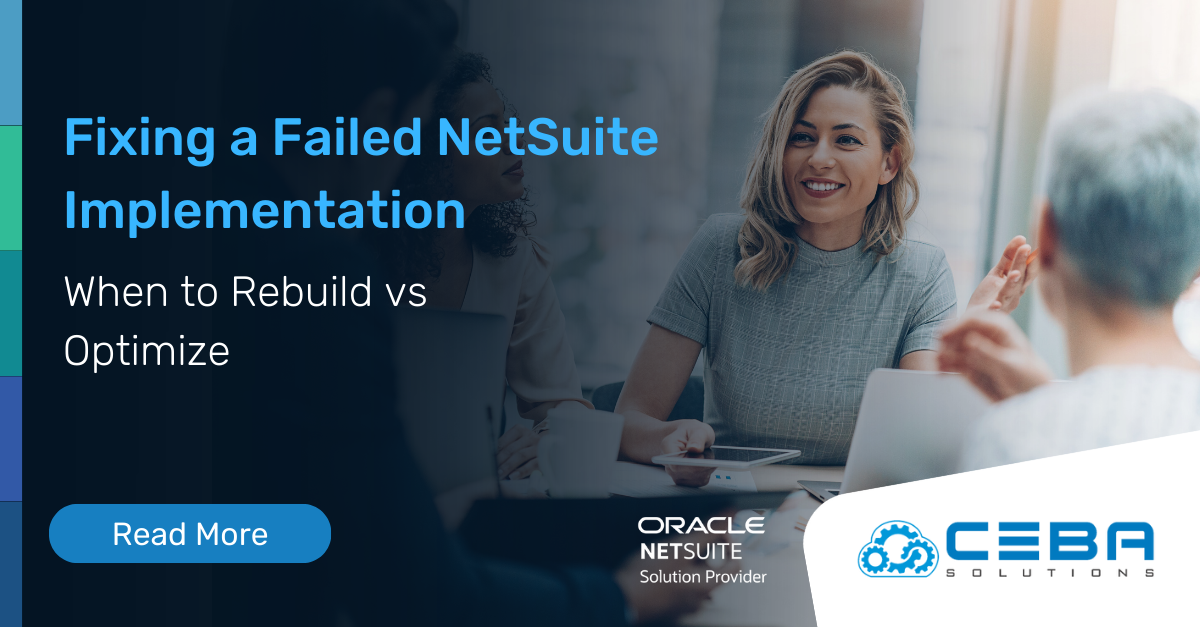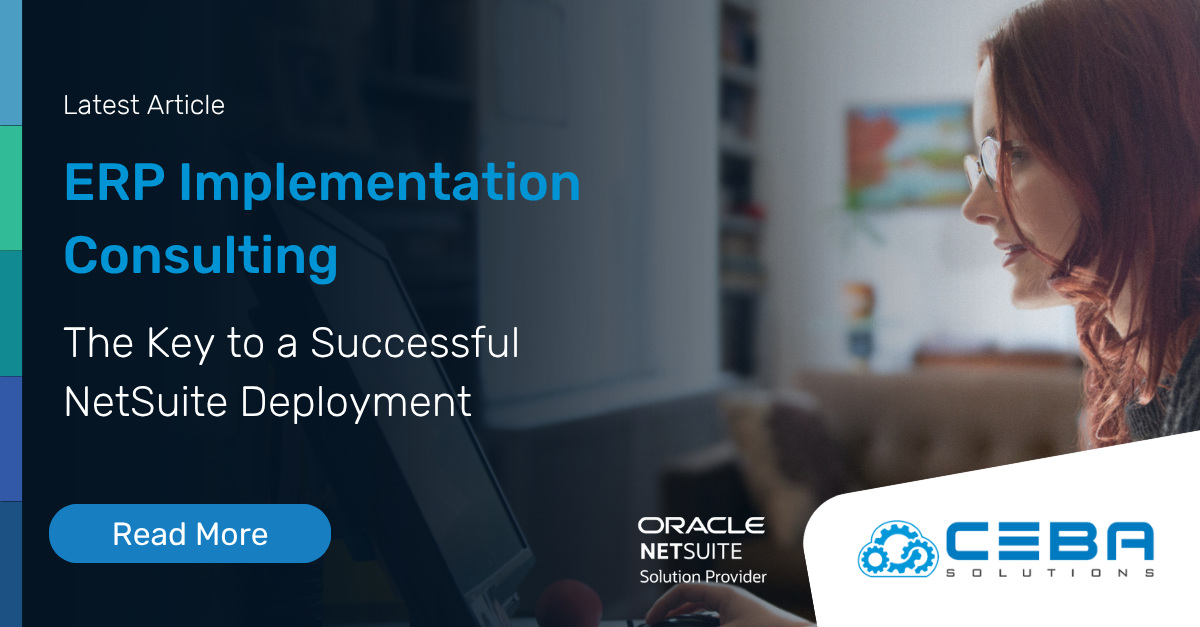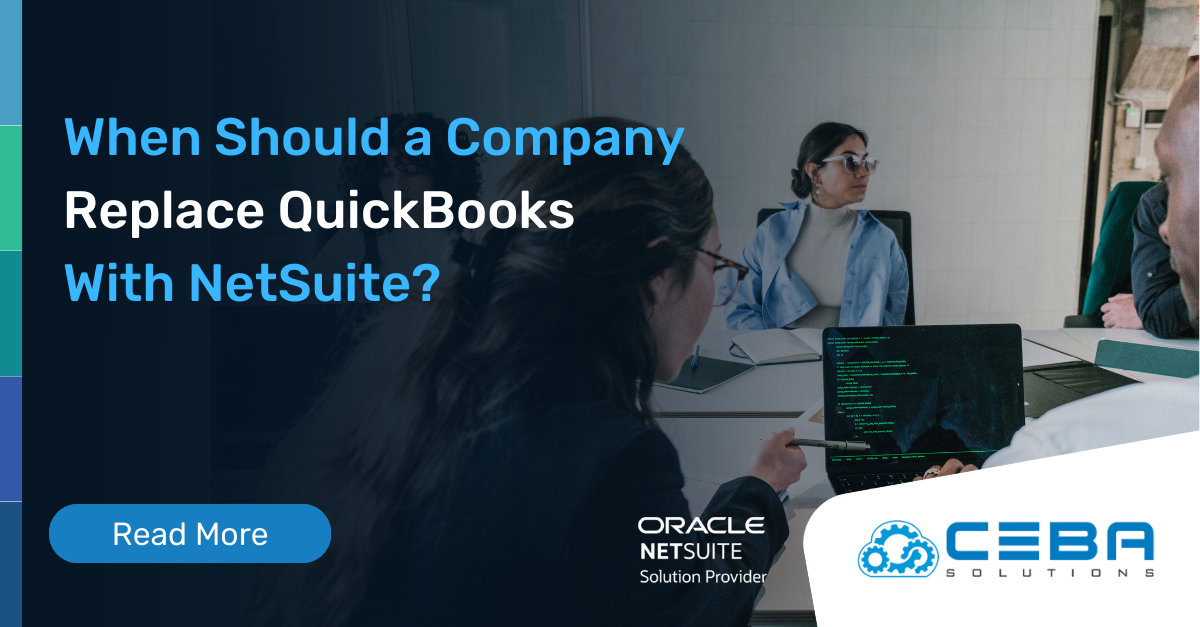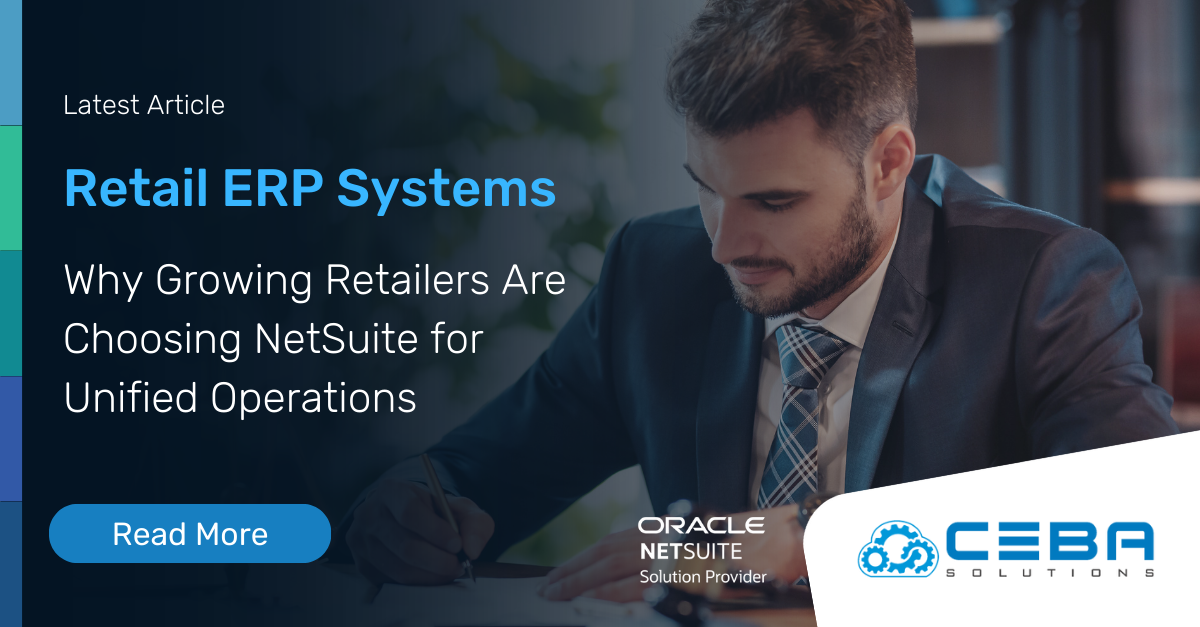
Top Benefits of NetSuite Cloud ERP for Small Businesses
Top Benefits of NetSuite Cloud ERP for Small Businesses
Small businesses face a rapidly changing environment filled with both opportunities and challenges. As companies strive to scale up, streamline operations, and stay competitive in the market, they’re often weighed down by legacy systems, fragmented tools, and ineffective processes. This is where an integrated Enterprise Resource Planning (ERP) solution becomes essential, offering a centralized platform to manage key business functions like finance, inventory, sales, and customer relationships.
For small businesses, cloud ERP systems like NetSuite present a particularly compelling opportunity. Not only is it crucial to have technology that grows alongside your company, but the need for flexibility, cost-efficiency, and real-time insights is more pressing than ever. With remote work on the rise, customer expectations constantly evolving, and supply chain disruptions becoming more frequent, small businesses need robust digital tools to help them navigate this complex business landscape.
This article will explore the top benefits of adopting NetSuite Cloud ERP specifically for small businesses. From streamlining operations and improving financial visibility to enabling scalability and supporting better decision-making, we’ll explore how NetSuite is enhancing both productivity and profitability for businesses on a growth trajectory.
Evolution of ERP Systems and Cloud Solutions
Enterprise Resource Planning (ERP) systems have been an integral part of business operations since the 1990s, designed to integrate and manage core business processes such as finance, supply chain, and human resources. Initially, ERPs were hosted on-premise, requiring substantial investments in infrastructure, hardware, and IT support. These traditional systems were often costly and complex, making them inaccessible for smaller businesses.
As cloud computing emerged in the early 2000s, it revolutionized how businesses accessed and utilized ERP systems. Instead of owning on-site hardware and software, companies could access ERP functionality through a web browser, reducing cost and complexity. NetSuite, which launched in 1998 as the first cloud-based ERP system, was a pioneer in this space, offering a more affordable and scalable ERP solution for businesses of all sizes.
The Rise of Cloud ERP for Small Businesses
Small businesses need agility, efficiency, and affordability in their business management tools to compete with larger enterprises. Cloud-based ERP systems, like NetSuite, have become increasingly popular because they reduce overhead costs, streamline operations, and offer real-time data access.
Small businesses no longer need to maintain expensive IT infrastructure or upgrade software versions. The cloud model provides automatic updates and maintenance. As a leading cloud ERP provider, NetSuite has continuously adapted to meet the needs of small-to-medium-sized enterprises (SMEs), providing more customizable and scalable solutions for businesses in diverse industries such as retail, manufacturing, and services.
Enhanced Inventory and Order Management
Improved Order Accuracy and Customer Satisfaction Another crucial benefit of NetSuite Cloud ERP for small businesses is its ability to enhance inventory and order management. Small businesses often face significant challenges in managing their supply chain efficiently, particularly when using manual systems or multiple siloed applications. Discrepancies in stock levels, frequent out-of-stock scenarios, or delays in fulfilling customer orders can severely impact customer satisfaction and profitability. With NetSuite, businesses can automate and centralize inventory data, enabling real-time visibility into stock levels, order status, and fulfillment processes.
Scalability and Adaptability to e-Commerce Trends
With the rapid growth of e-commerce and the increasing popularity of multi-channel selling strategies, small businesses must adapt or risk being left behind. The integration of e-commerce platforms with NetSuite Cloud ERP offers businesses the agility to meet growing customer demands.
NetSuite seamlessly connects online storefronts with backend systems, making it easy to update inventory levels, synchronize order information, and provide real-time shipping estimates. This capability greatly improves customer experiences, ultimately leading to higher levels of retention and brand loyalty.
How Go-Pro Grew with NetSuite
A real-world example can be seen in the success story of GoPro, which adopted NetSuite ERP to manage its global multi-channel retail and e-commerce operations. Although GoPro is now a well-known brand, it initially faced struggles maintaining adequate inventory levels amidst its rapid sales growth. NetSuite enabled accurate demand forecasting and enhanced fulfillment efficiency, allowing the company to scale seamlessly through various retail and e-commerce channels.
Challenges and Opportunities of Utilizing NetSuite Cloud ERP for Small Businesses
Implementation Challenges for Small Businesses
One of the most significant challenges small businesses face when adopting NetSuite Cloud ERP is the complexity of implementation. The system is highly customizable, which can make it daunting for smaller companies with limited IT resources or technical expertise. Implementation often requires external consultants, which can increase costs, making it more difficult for startups or small companies with tight budgets.
Despite these obstacles, businesses that successfully implement NetSuite can consolidate multiple IT systems into a single, unified platform. With proper planning and consultation, companies can benefit from streamlined operations, reducing redundant processes that would typically require multiple software solutions. Small businesses can scale their operations without needing to invest again in another system. According to an analysis by Nucleus Research, customers achieve a $7.22 ROI on every dollar invested in ERP systems like NetSuite, underscoring the long-term financial benefit.
Data Migration and Change Management
Migrating sensitive and extensive customer, inventory, or financial data to a new cloud-based ERP system can be particularly tricky. Many small businesses fear data loss, along with the accompanying disruption in business operations during the migration process. Furthermore, the workforce may resist adopting new technology due to unfamiliarity, leading to delays and frustration.
By transitioning to NetSuite Cloud ERP, businesses enjoy real-time data and analytics, which enhances decision-making capabilities. Once the initial migration is smooth, small businesses experience enhanced transparency in operations, better forecasting, and heightened inventory and supply chain management, resulting in long-term operational efficiency. A case study of Lume Cube, a lighting company, shows that upon adopting NetSuite, they eliminated manual processes, reduced overhead, and scaled operations tenfold.
Subscription Costs and Customization Needs
NetSuite operates on a subscription-based model, which might seem more expensive upfront compared to cheaper, less comprehensive solutions. Small businesses with irregular cash flow might find it hard to afford the annual fees. Additionally, the gap between out-of-the-box functionality and specific operational needs might require further investment in customization, which can be a deterrent.
Despite this concern, a customizable ERP system offers enormous long-term cost savings. Since NetSuite is tailored to fit every aspect of a business’s operations—finance, HR, customer relationship management, or e-commerce—companies don’t need to pay for multiple tools or worry about integrating systems.
"Small businesses need an ERP solution that not only integrates core processes but also provides the flexibility to adapt and scale. NetSuite Cloud ERP offers a dynamic and cost-effective option to support growth." – Zabe Siddique, CEO - CEBA Solutions
Best Practices for Leveraging NetSuite Cloud ERP Benefits for Small Businesses
Optimize Cost Efficiency Through Strategic Implementation
One of the top benefits of NetSuite Cloud ERP for small businesses is its cost-effectiveness. To maximize this advantage, adopt a phased implementation approach, rolling out critical features first that will offer the most immediate return on investment. Utilize modular adoption, meaning you can easily integrate additional functionalities as your business grows. Additionally, regularly review your business processes to eliminate redundant tasks, and lean into automation features such as automatic billing, procurement, or reporting. By doing so, you’ll reduce costs associated with labor and improve operational efficiency.
Focus on Long-Term Growth
Small businesses can capitalize on NetSuite’s inherent scalability by planning for growth from the outset. Future-proof your ERP setup by configuring NetSuite to accommodate potential increases in transaction volume, users, or additional modules such as customer relationship management (CRM) or ecommerce. Use NetSuite’s analytics tools to monitor business growth and identify new opportunities early. Establish a flexible setup within NetSuite that allows for quick reconfiguration as business needs evolve. Furthermore, NetSuite’s cloud platform ensures you are always using the latest version, so commit internal resources to stay current by periodically attending NetSuite’s training or webinars to stay ahead of technology shifts.
Embrace Data-Driven Decision-Making
NetSuite’s robust reporting and analytics tools are powerful but require strategic utilization to be effectively leveraged. Train your team to generate and understand customized, real-time dashboards that help visualize data relevant to each department. Start simple by focusing on KPIs directly linked to revenue, expenses, and productivity. Set up automated alerts for critical metrics, like cash flow dips, fulfillment delays, or stock shortages. Additionally, establish a regular review cadence (e.g., weekly or monthly) to adjust strategies in real-time based on the insights drawn from these reports. By focusing on systematic implementation, scalability, and data-driven decision-making, small businesses can unlock the full potential of NetSuite Cloud ERP while minimizing complications.
Final Thoughts
NetSuite Cloud ERP offers a comprehensive and transformative solution specifically tailored to address the unique challenges faced by small businesses. By streamlining financial management, enhancing inventory control, and offering real-time insights, NetSuite empowers businesses to operate more efficiently while minimizing errors, reducing costs, and improving decision-making abilities.
Adopting NetSuite Cloud ERP represents not just a technology upgrade but a significant step toward long-term operational excellence.
Ready to Transform Your Business with NetSuite Cloud ERP?
Implementing NetSuite Cloud ERP is a game-changer for small businesses, from optimizing costs to fueling long-term growth and making data-driven decisions. Now that you know the key benefits, don’t stop here - take the next step! Contact us for a personalized consultation to see how NetSuite can be tailored to your unique business needs. Or, subscribe to our newsletter for expert insights or download our free strategy guide NetSuite for Small Business.









